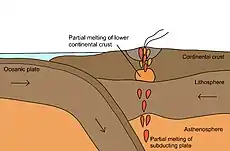
Bimodal volcanism is the eruption of both mafic and felsic lavas from a single volcanic centre with little or no lavas of intermediate composition. This type of volcanism is normally associated with areas of extensional tectonics, particularly rifts.
Occurrence
Most occurrences of bimodal volcanism are associated with thinning of the crust and the presence of such rocks in metamorphic sequences has been used to provide evidence for past rifting events.[1] Most examples come from areas of active continental rifting such as the Basin and Range Province. Bimodal volcanism has also been described from areas of transtension,[2] the early phases of back-arc basin formation[3] and in the products of both continental and oceanic hotspots (e.g. Yellowstone, Anahim and the Canary Islands).[4][5][6]
Mechanism of formation
Bimodal volcanism is normally explained as a result of partial melting of the crust, creating granitic magmas, during the emplacement of large volumes of relatively hot basaltic magma from a mantle source. The two magma types then form separate magma chambers giving rise to periodic eruption of both types of lava.[7][8]
See also
References
- ↑ Brewer, T.S.; Åhäll, K.-I.; Menuge, J.F.; Storey, C.D.; Parrish, R.R. (2004). "Mesoproterozoic bimodal volcanism in SW Norway, evidence for recurring pre-Sveconorwegian continental margin tectonism". Precambrian Research. 134 (3–4): 249–273. Bibcode:2004PreR..134..249B. doi:10.1016/j.precamres.2004.06.003.
- ↑ Till, Alison B.; Roeske, Sarah M.; Bradley, Dwight C.; Friedman, Richard; Layer, Paul W. (2007). "Early Tertiary transtension-related deformation and magmatism along the Tintina fault system, Alaska" (PDF). Special Paper 434: Exhumation Associated with Continental Strike-Slip Fault Systems. Vol. 434. pp. 233–264. doi:10.1130/2007.2434(11). ISBN 978-0-8137-2434-8. Archived from the original (PDF) on 2017-08-11. Retrieved 2009-05-30.
- ↑ Fujioka, K., Nishimura, A., Koyama, M., and Kotake, N., 1990. Bimodal arc volcanism and backarc rifting along Izu-Bonin Arc. Eos, 71, 956.
- ↑ Christiansen, R.L.; Foulger G.R.; Evans J.R. (2002). "Upper-mantle origin of the Yellowstone hotspot" (PDF). Bulletin of the Geological Society of America. 114 (10): 1245–1256. Bibcode:2002GSAB..114.1245C. doi:10.1130/0016-7606(2002)114<1245:umooty>2.0.co;2. Archived from the original (PDF) on 4 March 2016. Retrieved 3 December 2012.
- ↑ Kuehn, Christian; Guest, Bernard; K. Russell, James; A. Benowitz, Jeff (2015). "The Satah Mountain and Baldface Mountain volcanic fields: Pleistocene hot spot volcanism in the Anahim Volcanic Belt, west-central British Columbia, Canada". Bulletin of Volcanology. Springer: 25.
- ↑ Freundt-Malecha, B.; Schminke H.-U.; Freundt A. (2001). "Plutonic rocks of intermediate composition on Gran Canaria: the missing link of the bimodal volcanic rock suite". Contributions to Mineralogy and Petrology. 141 (4): 430–445. Bibcode:2001CoMP..141..430F. doi:10.1007/s004100100250. S2CID 128768061.
- ↑ Maria, A.; Hermes, O. Don (2001). "Volcanic rocks in the Narragansett basin, southeastern New England: Petrology and significance to early basin formation". American Journal of Science. 301 (3): 286–312. Bibcode:2001AmJS..301..286M. doi:10.2475/ajs.301.3.286.
- ↑ Tamura, Y. (2002). "Remelting of an Andesitic Crust as a Possible Origin for Rhyolitic Magma in Oceanic Arcs: An Example from the Izu-Bonin Arc". Journal of Petrology. 43 (6): 1029–1047. doi:10.1093/petrology/43.6.1029.
